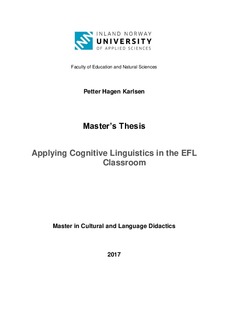| dc.contributor.author | Karlsen, Petter Hagen | |
| dc.date.accessioned | 2018-05-23T12:55:11Z | |
| dc.date.available | 2018-05-23T12:55:11Z | |
| dc.date.issued | 2017 | |
| dc.identifier.uri | http://hdl.handle.net/11250/2498952 | |
| dc.description | Mastergradsoppgave i kultur- og språkfagenes didaktikk, Avdeling for lærerutdanning og naturvitenskap, Høgskolen i Innlandet, 2017. | nb_NO |
| dc.description.abstract | English:
This thesis explores cognitive science and linguistics to connect theory and research on cognition to vocabulary teaching in the EFL classroom. In 2016, the Norwegian Ministry of Education and Research proposed a revision of Kunnskapsløftet, based on a report by Ludvigsen-utvalget, which had a focus on deep-level learning (Kunnskapsdepartementet, 2016). This proposition contributed to the background of this thesis. The thesis question was: “How can research in cognitive linguistics be applied to teaching vocabulary in the EFL classroom?”, which also entailed a comparison to authentic teaching practice, and the exploration of possibilities and challenges with implementing a cognitive linguistics framework in the classroom. The research was conducted through extensive reading of theory and previous studies, which became the basis of twelve lesson plans with a cognitive linguistics foundation. To relate the research to an authentic teaching scenario, a 4th grade teacher was observed for three weeks in her regular English teaching practice. During an additional three-week period, the same 4th grade teacher implemented the lesson plans based on cognitive linguistics in her classroom, a process which was also observed. At the end of the second observation period, a reflection note was filled out by the teacher to gain her perspectives on the implementation. The study found that cognitive linguistics promotes deep-level learning by approaching lexical items as concepts and categories, and by having the pupils actively engaging with the language through communication and association exercises. The study also suggested that knowledge of cognitive linguistics entails a systematic view of language, in which English can be taught systematically and incrementally, at various levels of abstraction. The main challenges were the heightened requirements of time and pupil proficiency during the cognitive linguistics-based lessons. | nb_NO |
| dc.description.abstract | Norsk:
Denne oppgaven utforsker kognitive forskning og lingvistikk for å sammenkoble teori og forskning på kognisjon med vokabularundervisning i et EFL-klasserom. Kunnskapsdepartementet foreslo i 2016 en revisjon av Kunnskapsløftet basert på en rapport fra Ludvigsen-utvalget, som hadde fokus på dybdelæring (Kunnskapsdepartementet, 2016). Dette forslaget medvirket til denne oppgavens bakgrunn. Forskningsspørsmålet var: «Hvordan kan forskning innen kognitiv lingvistikk anvendes i vokabularundervisning i et EFL-klasserom?», hvilket også innebar en sammenligning med autentisk undervisningspraksis, samt utforskning av muligheter og utfordringer ved implementeringen av et kognitivt lingvistisk rammeverk i klasserommet. Studien ble gjennomført ved omfattende lesing av teori og tidligere forskning, hvilket ble basisen for tolv undervisningsopplegg. For å relatere forskningen til en autentisk undervisningssituasjon ble en fjerdeklasselærer observert i tre uker gjennom hennes normale praksis. Under ytterligere tre uker ble undervisningsoppleggene implementert; en prosess som også ble observert. Ved slutten av siste observasjonsperiode fylte læreren ut et refleksjonsnotat for å synliggjøre hennes perspektiv på implementeringen. Studien fant ut at kognitiv lingvistikk promoterer dybdelæring ved å håndtere enheter av språk som konsepter og kategorier, og ved å la elevene aktivt jobbe med språket gjennom kommunikasjon og assosiasjonsøvelser. Studien foreslo også at kunnskap om kognitiv lingvistisk medfører et systematisk syn på språk, hvilket fører til at språkundervisning kan foregå systematisk og gradvis, og fra det konkrete til det mer abstrakte. De største utfordringene var det økte kravet til tidsbruk og elevens kunnskapsnivå under de kognitiv lingvistikk-baserte undervisningsoppleggene. | nb_NO |
| dc.language.iso | eng | nb_NO |
| dc.subject | MIKS | nb_NO |
| dc.subject | kognitiv lingvistikk | nb_NO |
| dc.subject | vokabular | nb_NO |
| dc.subject | EFL | nb_NO |
| dc.subject | språklæring | nb_NO |
| dc.title | Applying Cognitive Linguistics in the EFL Classroom | nb_NO |
| dc.title.alternative | Anvendelse av kognitive lingvistikk i EFL-klasserommet | nb_NO |
| dc.type | Master thesis | nb_NO |
| dc.subject.nsi | VDP::Humaniora: 000::Språkvitenskapelige fag: 010 | nb_NO |
| dc.source.pagenumber | 121 | nb_NO |
